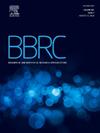Effect of infection by Mycoplasma arginini and Mycoplasma salivarium on the oncogenic properties of lung cancer cell line A549
IF 2.5
3区 生物学
Q3 BIOCHEMISTRY & MOLECULAR BIOLOGY
Biochemical and biophysical research communications
Pub Date : 2024-10-23
DOI:10.1016/j.bbrc.2024.150878
引用次数: 0
Abstract
Most mycoplasma species are the extracellular parasites affecting different cellular processes including proliferation, cell cycle, protein synthesis, DNA repair and others. Mycoplasma infection was shown to contribute to the pathology of various diseases, including cancer. Upon infection, mycoplasmas typically activate the tumor-associated NF-kB pathway, which is associated with EMT, the main mechanism of metastasis.
In this study, we found that two different mycoplasma strains, M. arginini and M. salivarium, promoted the initiation of EMT and simultaneous suppression of the p53 tumor suppressor in A549 lung cancer cells. This led to an increase of cancer cell motility, resistance to the antitumor drug etoposide concomitantly with decreased autophagy. These data indicate that mycoplasmas are able to increase the tumorigenic potential of cancer host cells.
精支原体和唾液支原体感染对肺癌细胞株 A549 致癌特性的影响
大多数支原体是细胞外寄生虫,会影响不同的细胞过程,包括增殖、细胞周期、蛋白质合成、DNA 修复等。支原体感染已被证明会导致包括癌症在内的多种疾病的病理变化。支原体感染后通常会激活肿瘤相关的 NF-kB 通路,而 NF-kB 通路与肿瘤转移的主要机制 EMT 相关。在这项研究中,我们发现两种不同的支原体菌株--M. arginini 和 M. salivarium--在 A549 肺癌细胞中促进了 EMT 的启动,并同时抑制了 p53 肿瘤抑制因子。这导致癌细胞运动性增加,对抗肿瘤药物依托泊苷产生抗药性,同时自噬功能降低。这些数据表明,支原体能够增加癌症宿主细胞的致瘤潜力。
本文章由计算机程序翻译,如有差异,请以英文原文为准。
求助全文
约1分钟内获得全文
求助全文
来源期刊
CiteScore
6.10
自引率
0.00%
发文量
1400
审稿时长
14 days
期刊介绍:
Biochemical and Biophysical Research Communications is the premier international journal devoted to the very rapid dissemination of timely and significant experimental results in diverse fields of biological research. The development of the "Breakthroughs and Views" section brings the minireview format to the journal, and issues often contain collections of special interest manuscripts. BBRC is published weekly (52 issues/year).Research Areas now include: Biochemistry; biophysics; cell biology; developmental biology; immunology
; molecular biology; neurobiology; plant biology and proteomics

 求助内容:
求助内容: 应助结果提醒方式:
应助结果提醒方式:


